Latest Contributions
Read More Contributions
Memories of My Favourite Uncle and Nawab Manzil, Baroda
Category:
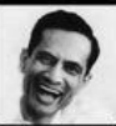
Dr. Kadri, a surgeon, lives in New Zealand. He was born in 1927, and grew up in Ahmedabad.
Editor's note: This article originally appeared on http://posterous.com/site/profile/munirsmemories It is reproduced here with Dr. Kadri's consent.
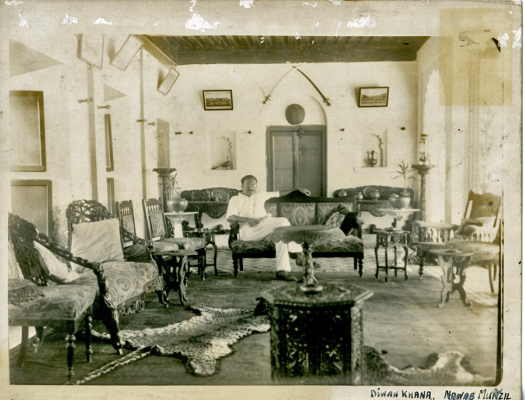
From time to time we used to visit our relatives in Baroda (now Vadodara). Back then, in the 1930s, it was the capital of the princely state of Baroda, the Maratha kingdom of Gaekwad.
Our relatives came from the nawab family that ruled Baroda before it was conquered by the Marathas. They were a joint family of three brothers, living together under the same roof in the traditional Indian manner at their grand home called Nawab Manzil.
Nawab Manzil was an opulent home. It housed our relatives and an array of staff - cooks, valets, sweepers and butlers, alongside accountants and secretaries. It was a sprawling and spacious residence. You entered it through a high wooden gate, and the front was supported by impressive wooden pillars, painted in soft yellows and greens. There was an inner courtyard and extensive garden, plus a majestic staircase leading to the bedrooms. It sparkled at nighttime, lit by gas lamps.
My three uncles were poles apart in their demeanour, character, habits and thinking. The oldest was Aminuddin Hussain Khan, the middle one Moizuddin Hussain Khan and then was my favourite: Fakhruddin Hussain Khan who we called Dr. Uncle or Chote Manmoon Sahib (younger uncle). All the three were highly intelligent but each had his own leanings and a different sense of humour. When their father, Nawab Sadruddin Hussain Khan, was alive, they led a life of affluence and aplomb. He was a landlord of some substance in those days. When the Maratha Gaekwads conquered Baroda and defeated the nawabs, a treaty was entered into which entitled the nawabs to substantial land ownership that included a number of villages. These holdings were scattered all over Gujarat and brought in a considerable income. Sadly, my three uncles lost their father when in their teens.
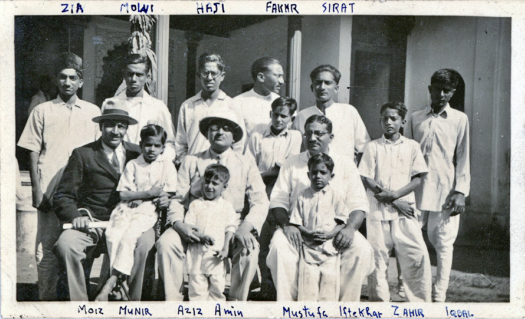
We lived in Ahmedabad. My father had been married to the sister of these three uncles - though she died and he later married my mother. I have some vivid memories of my first visit to Nawab Manzil in 1932 when I was 5 years old, and my brother Iftikhar was 3. We used to go regularly to Nawab Manzil during our school holidays. Baroda was 60 odd miles from Ahmedabad. We always travelled by railway train.
Although our own bungalow in Ahmedabad had its own distinguished charm, we used to love the glamour of Nawab Manzil. We would revel in the sumptuous breakfasts and luxurious dinners - all prepared and served by an entourage of servants. These were lavish experiences, which we all enjoyed as a large family. Breakfasts could go on for 1 to 2 hours with the uncles debating various topics from their divergent perspectives. They were more Anglicised than our family and it was at Nawab Manzil that I first discovered marmalade.
Dr. Uncle was by far my favourite uncle. Being an ardent follower of Gandhi, he was very particular about the dignity of labour and only wore homespun khadi. He took up the gardening at Nawab Manzil. No gardener was employed, though the family could easily afford one. He taught me how to do grafting of one plant on another. He also encouraged me to take up stamp collecting, leaf pressing and coin collecting.
When I was five years old, Dr. Uncle had taught me how to ride a bicycle. Years later, when I was 16, I embarked on an epic bicycle trip of 1,800 km from Ahmedabad to Pune and back, with my brother Iftikhar, cousin Sharif and another friend, Usman. It was especially fitting that we passed by Baroda and were enthusiastically welcomed by Dr. Uncle, given that he originally taught me how to ride a bicycle with such loving patience.
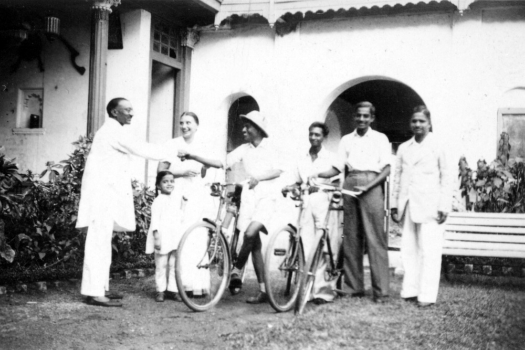
Dr. Uncle was a close friend of Jawaharlal Nehru, who later became the first Prime Minister of India. Nehru visited Nawab Manzil many times, sometimes when we were there. I first met him there at age 12 - before India became independent. Both Dr. Uncle and Nehru were freedom fighters. Nehru was invariably accompanied by his daughter Indira, who herself became the Prime Minister of India after the death of Nehru. During the struggle of Independence, Dr. Uncle used to travel a lot and always had a suitcase packed and handy to pick up and take off. We learnt many things from him. How to be tidy, the dignity of labour, collecting all sorts of things and passionate love of India.
During the 1938, Dr. Uncle returned from the US and on his way back stopped in Germany. There he married Else, a young and remarkably pretty blonde German woman. They were married in a mosque in Berlin. He brought her to India and I initially met her on our first trip to Kashmir. She was stunningly beautiful. We called her Else Aunty. In 1946, the three brothers separated and there was a division of property. The family had numerous plots in Baroda and scattered all over Gujarat. When the properties were divided, Nawab Manzil stayed in the possession of my Dr. Uncle and he continued to live there with his family, which now consisted of Uncle, Else Aunty and their newly arrived daughter called Wali.
Wali was born in Baroda in 1940. When she was only 2 months old, Else Aunty was sent for the duration of the war to German internment camps. She had a hard time with such a young child. Initially they were at the camp in Satara and later in Purandhar. There were some visiting privileges and I remember Dr. Uncle regularly making visits to the camps. They were released at the end of the war in 1944.
Years later, in 1956, I was off to the UK to pursue my Fellowship of the Royal College of Surgeons (FRCS). As the Suez Canal was closed our ship was to sail round the Cape of Good Hope. My whole family and my favourite uncle came to the ship at the Bombay Pier to bid me farewell. It was the last time I saw my favourite uncle but he was eager for me to be on my way and explore the world. Memories of his positive influence followed me across the ocean and remain with me to this day.
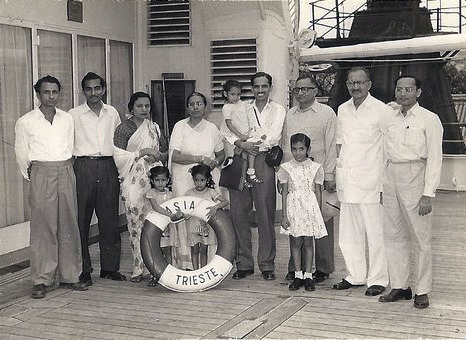
© Munir Kadri 2011
Add new comment